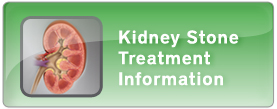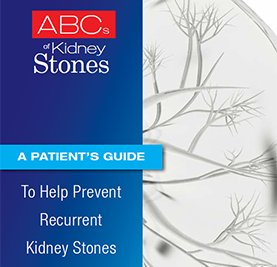- Home
- For Patients
- What Causes Kidney Stones?
What Causes Kidney Stones?
Different kinds of stones form in different people for different reasons.
- High blood pressure, diabetes, osteoporosis, chronic diarrhea, and other diseases can increase the risk of stone formation
- Obesity is also a major risk factor
- Heredity can play a role in the formation of some kinds of stones
- Certain metabolic imbalances, such as too much (or too little) calcium or too much oxalate, a common by-product of food, may be involved
- Some medications and supplements, including guaifenesin (for coughs), topiramate (for epilepsy), and phosphate-binding antacids, can increase the risk of stone formation
Diet and lifestyle
Other important risk factors for stone formation are directly related to diet and lifestyle, such as excessive salt intake and consuming too much animal protein (meat, poultry, and fish). Not drinking enough fluids is strongly linked to kidney stones.
Substances that encourage or discourage stone formation can be divided into 2 categories.
Stone promoters
Promoters are substances that increase the levels of stone-forming salts in the kidney. They are frequently associated with certain foods or medications (see table below). Inadequate fluid consumption also promotes stone disease because it leads to higher concentration of salts in the kidney. Dehydration is strongly linked to kidney stones.
Stone inhibitors
Inhibitors are substances that slow the formation and growth of stones. When the urine has low levels of inhibitors, kidney stones are more likely to develop. One of the most important inhibitors of kidney stones is citrate.
A handy rule of thumb in preventing stone disease is to avoid the stone promoters and focus on stone-inhibiting strategies. The table below shows a quick overview.
| Stone promoters | Stone-inhibiting strategies |
|---|---|
| Not enough fluid intake, low urine output, high urine supersaturation | Drink at least 3 liters (quarts) of water or other low-sugar, low-calorie beverages daily, distributed throughout the day as much as possible |
| Too much salt intake | Restrict salt to 2000-2400 mg/day by reducing intake of processed foods, cheese, luncheon meats, salty snacks, and added salt |
| Too much animal protein (meat, poultry, fish) | Limit meat, poultry, and fish intake as needed to reduce targeted risk factors* identified by your doctor (such as high urine calcium or high urine uric acid); limit of 6 ounces per day is a good starting goal |
| Too much oxalate absorbed in the digestive tract (oxalate is commonly found in many plant foods) | If you normally eat a lot of high-oxalate foods (spinach, beets, chocolate, nuts, seeds, and potatoes), reduce portion sizes and eat them less often1 If your diet is already low in high-oxalate foods, follow normal recommendations for dairy intake; it is important not to restrict calcium-containing foods because calcium binds with oxalate in your digestive tract to reduce the amount of oxalate in the kidneys |
- The Medical News [Internet]. Mayo Clinic discusses kidney stone treatment options [cited 2010 Mar 11]. Available at: http://www.news-medical.net/news/20090917/Mayo-Clinic-Health-Letter-discusses-kidney-stone-treatment-options.aspx.
This information is intended to augment, not replace, the advice of your doctor. If you have any questions about this content, please talk to your doctor.


